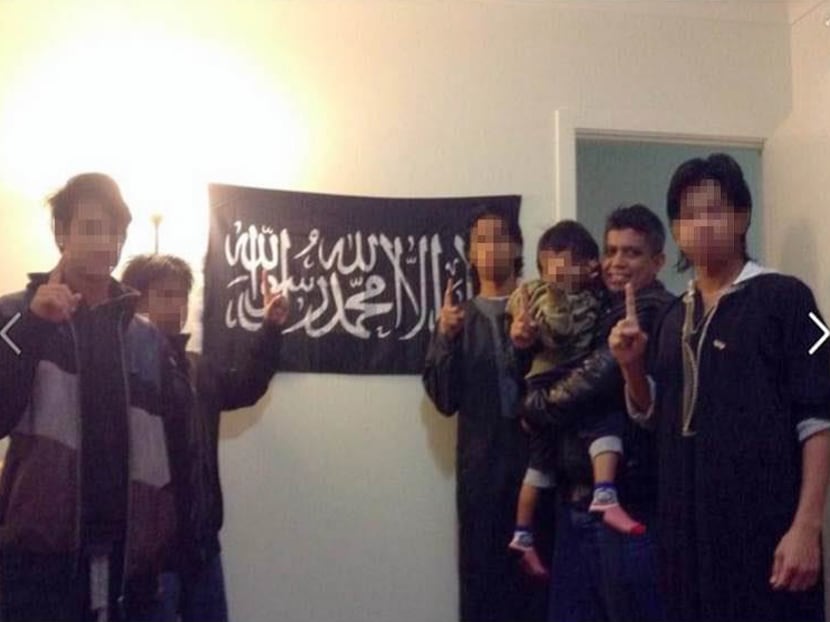Two Singaporeans detained under ISA for terror-related activities
SINGAPORE — Two Singaporeans have been detained under the Internal Security Act (ISA) for terrorism-related activities — a 44-year-old Singaporean who contributed to the radicalisation of at least two other Singaporeans with his messages, and a former detainee who relapsed.

A photo Zulfikar Shariff posted on his Facebook page of himself with his children in front of a flag used by jihadi terror groups. Photo: MHA
SINGAPORE — Two Singaporeans have been detained under the Internal Security Act (ISA) for terrorism-related activities — a 44-year-old Singaporean who contributed to the radicalisation of at least two other Singaporeans with his messages, and a former detainee who relapsed.
In addition, a 17-year-old madrasah graduate and a businessman have been issued Restriction Orders, after the authorities found they had become radicalised, with the former allegedly harbouring the intention of fighting in Syria someday, and trying to influence his friends with his pro-Islamic State in Iraq and Syria (Isis) views. This is the third round of detentions under the ISA announced this year.
Speaking to the media after the detentions were announced, Home Affairs Minister K Shanmugam said radicals who motivate others to kill are “more dangerous” than terrorists who carry out killings, as these “influencers” can brainwash normal people and turn them into terrorists.
The minister was referring to Singaporean Zulfikar Mohamad Shariff, 44, who was arrested on July 1 and detained under the ISA for terrorism-related activities. He influenced at least two others with radical messages and material he propagated online, including “numerous Facebook postings glorifying and promoting Isis and their violent actions, while exploiting religion to legitimise the terrorist activities of Isis”.
Zulfikar also exhorted Muslims to take up arms and wage militant jihad in places like the Middle East, Palestinian territories, Myanmar and the Philippines. As a way to win their support, he proposed the creation of a support system for the families of the fighters.
Zulfikar was radicalised as early as 2001, after reading jihadi-related material. Around that time, he stirred up controversy here with inflammatory views on several occasions while he was heading a civil society group called Fateha. In 2002, he fled to Australia with his family while under investigation for criminal defamation but kept up his pursuit of radical ideology, including by maintaining contact with radical preachers such as Musa Cerantonio and Anjem Choudary.
The MHA said Zulfikar wanted to convince others to reject the Western secular democratic nation-state system. He wanted to establish an Islamic caliphate in its place, through violent means, if necessary, added the MHA.
Noting that Zulfikar was on the dole while in Australia, paid with Australian taxpayers’ money, Mr Shanmugam criticised Zulfikar’s opposition to the democratic secular system.
He wanted to push this extremist agenda in Singapore too, which was why he actively looked into holding training programmes aimed at radicalising young Singaporeans. He also set up an online group called Al-Makhazin in 2013 to counter the Western media and used Facebook as a platform to agitate on Muslim issues in Singapore.
The MHA said: “In view of the high level of the terrorism threat that Singapore currently faces, and the global terrorism threat posed by ISIS, Zulfikar’s promotion of violence and ISIS and his radicalising influence pose a security threat to Singapore ... The Government takes a very serious view of efforts to undermine Singapore’s constitutional democracy, and will take firm and decisive action against any person who engages in such activities.”
Zulfikar’s actions contributed to the radicalisation of at least two Singaporeans: Muhammad Shamin Mohamed Sidik, 29, detained last August, and Mohamed Saiddhin Abdullah, 33, issued with a Restriction Order this month. The latter was radicalised through perusing radical online material and radical influences. He fingered Zulfikar, whom he befriended online, as the person who influenced him to support ISIS.
Not only did Saiddhin re-post Zulfikar’s postings on ISIS as a form of jihad, he also aped Zulfikar’s move to post a photo of himself posing like jihadi fighters while standing in front of an ISIS flag.
Speaking to reporters on Friday (July 29), Mr Shanmugam said: “The preachers, those who influence, stay under the radar, under the cover of religious freedom, freedom of speech, and Zulfikar is in the second category. He glorifies ISIS and beheadings, he believes that violence should be used to establish and Islamic caliphate in Singapore.”
He added: “People like Zulfikar are much more dangerous than Saiddhin, because he can make someone who’s perfectly normal, can brainwash them, and make them into a terrorist.”
In response to queries, the MHA said other “influencers” like Zulfikar have been detained before, including Haji Ibrahim B Haji Maidin, the Singapore JI spiritual leader who played a major role in indoctrinating members with violent ideology. In 2007, self-radicalised individual Muhammad Zamri bin Abdullah was detained for, among other things, influencing two other Singaporeans with his pro-armed jihad ideology; the two were also dealt with under the ISA.
Besides Zulfikar, 27-year-old Muhammad Fadil bin Abdul Hamid was also re-detained under the ISA for two years in April as he intended to join a terrorist group like ISIS and engage in armed violence in Syria.
He was previously detained from 2010 to 2012 because he had the intention to engage in armed violence in Afghanistan. After his release, he was placed on a Restriction Order.
The MHA said on Friday that Fadil had “initially made some progress in reintegrating into society” but became attracted to radical online material again and believed that partaking in the violence in Syria was “justifiable jihad”.
There are currently 20 persons in detention, one on suspension direction and 22 on Restriction Orders for terrorism-related activities.









